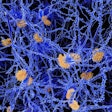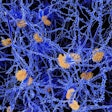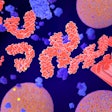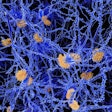
Elevated levels of the enzyme phosphoglycerate dehydrogenase (PHGDH) in the blood of elderly individuals may be an early indicator of Alzheimer's disease even before cognitive symptoms appear, according to new research published May 3 in Cell Metabolism.
In addition, the findings have some implications for taking brain-boosting dietary supplements that contain the amino acid serine. The key compound responsible for producing serine in the body is PHGDH. The scientists reported that PHGDH mRNA and protein levels had increased in the brains of two mouse models of Alzheimer's disease or tauopathy.
Moreover, the levels also progressively increased in human brains with no, early, and late Alzheimer's pathology, as well as in people with no, asymptomatic, and symptomatic Alzheimer's.
The researchers theorized that greater PHGDH expression indicated an increased rate of serine production in the brain, in contrast to what other research teams have concluded. These latest findings suggested that consuming serine supplements to battle the disease may not yield beneficial results.
Investigators at the University of California, San Diego had first identified PHGDH as a potential blood biomarker for Alzheimer's disease in research they reported in 2020. After analyzing blood samples of older adults, they found a steep increase in PHGDH gene expression in Alzheimer's patients, as well as in healthy individuals approximately two years before they were diagnosed with the disease.
Following up on their earlier results, the scientists, led by Sheng Zhong, PhD, a professor of bioengineering, wanted to determine if this increase could be linked back to the brain; their latest research has revealed that this is the case.
"Given the importance of synaptic pathophysiology to Alzheimer's disease (AD), these results raise the possibility that abnormalities in PHGDH expression could contribute to AD pathogenesis," the researchers wrote. "A missing key to this question is the direction of change of either serine level or PHGDH expression levels in AD."
Despite extensive efforts, changes in Lor D-serine level have not been unequivocally correlated with AD, the researchers wrote. This can make it particularly important to assess changes in PHGDH expression that may occur in Alzheimer's disease, they added.
Toward this end, the researchers analyzed genetic data collected from human brains from deceased subjects in four different research cohorts, each composed of 40 to 50 individuals aged 50 years and older. The subjects included patients with Alzheimer's disease; asymptomatic individuals without cognitive problems and without an Alzheimer's diagnosis, but whose post-mortem brain analyses showed early signs of Alzheimer's-related changes; and healthy control subjects.
The scientists reported a steady increase in PHGDH expression among Alzheimer's patients and asymptomatic individuals in the four cohorts compared to the healthy controls. They noted that expression levels were greater the more advanced the disease. They also observed this trend in two mouse models of Alzheimer's disease.
To validate the correlation of PHGDH protein level with Alzheimer's symptomatic development, the researchers compared the subjects' PHGDH expression levels with their scores on two different clinical assessments for dementia: the Dementia Rating Scale, which is a metric of a patient's overall level of cognitive functioning and which rates a person's memory and cognitive ability; and Braak staging, which rates the severity of Alzheimer's disease based on the brain's pathology.
The results showed that the worse the scores, the higher the expression of PHGDH in the brain, according to the scientists. The data suggested that there was an increase of hippocampal PHGDH expression as a patient's overall cognitive function declined, the researchers wrote.
The latest study also supported a previous observation of an Alzheimer's-associated increase in PHGDH extracellular RNA (exRNA) in human plasma. The results also help explain why the longitudinal increase of PHGDH exRNA can predict a clinical diagnosis of Alzheimer's disease.
Together, these data nominate circulating PHGDH exRNA as a possible diagnostic biomarker of late-onset Alzheimer's disease, the scientists indicated.
Beyond this finding, the researchers also felt that oral serine supplements as an easily available therapy for treating Alzheimer's disease should be used cautiously by patients, given that their data consistently showing increased PHGDH expression in Alzheimer's disease. Despite it being a cognitive enhancer, some evidence suggests that long-term use of serine contributes to neuronal death in Alzheimer's through excitotoxicity, which can cause nerve cells to suffer damage or die.
Next, the investigators want to further examine PHGDH behavior and how changing PHGDH gene expression might affect disease outcomes.



















